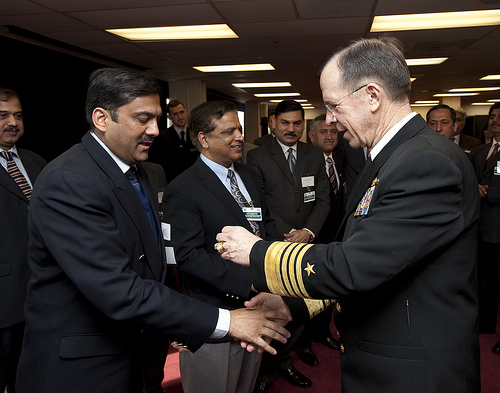U.S.-Pakistan Alliance Fraught With Distrust

As U.S. aid to Pakistan amounts to billions of dollars annually, the fact that bin Laden was found in a wealthy suburb so close to the Pakistani military academy raises suspicion about Pakistan’s capability and intention to actively fight terrorism.
Such an incident further complicates the strained cooperation and diplomacy between the United States and its main regional ally in the war on terror.
Historically, the relationship between the U.S. intelligence community and its Pakistani counterpart, the Inter-Services Intelligence Directorate, or ISI, has been fraught with distrust. Starting with U.S. involvement in Afghanistan in the 1980s with the help of the ISI, it is clear that Pakistan’s spy agency has been pushing its own agenda in the region.
With the Raymond Davis case, where a CIA contractor was recently jailed over the killing of two Pakistanis in Lahore, and the drone strikes against militants in the border areas, the well of Pakistani goodwill has visibly dried up. The level of suspicion between CIA officers and ISI agents highlight the difficulty of maintaining a strong working relationship.
While intelligence agencies rarely cooperate fully with one another, the public sniping reported through the media reveals the deep divide between CIA and ISI that only appears to be growing. The fact that bin Laden was killed in Abbottabad after living there seemingly undetected for five years may justify recent thoughts in the U.S. intelligence community that Pakistan is playing a double game.
Although ISI claimed that they were unaware of Bin Laden’s whereabouts, the claim seems unlikely and disingenuous. The more probable case is that there are rogue elements within ISI that helped hide and shelter Bin Laden from the U.S. This raises a troubling question about Pakistan’s role as an ally in the war on terror. At best, it is completely incompetent. At worst, Pakistan is actively supporting terrorism with at least some help from U.S. aid money. Neither scenario is appealing to lawmakers that voted in the past to supply Pakistan with economic and military aid.
In the aftermath of bin Laden’s death, diplomatic relations are becoming more strained. Pakistan suffered a great humiliation on the international stage but has been far from apologetic. Rather, it has been unrepentant -- if not downright defiant. The state has condemned the unilateral raid and has said that such action will not be tolerated in the future. On Monday, Prime Minister Yousaf Gilani effectively stated that Pakistani officials would not accept responsibility for bin Laden being found in the country. To top it off, the present CIA station chief’s name was leaked on Monday afternoon, five months after the former station chief was forced to leave due to a similar incident. The leak is likely a form of Pakistani retaliation for the raid. In the U.S., some lawmakers have criticized the relationship with Pakistan and have called for an end to continued economic aid, which Pakistan desperately needs.
Such a problem is not easy to resolve, as the U.S. cannot abandon its wayward ally. Whether the U.S. likes it or not, it still needs Pakistan’s help in the war on terror, especially in regard to Afghanistan. It is neither feasible nor practical to cut off aid to Pakistan, as some have called for. Such action would only further inflame the Pakistan’s view of the U.S. and result in less cooperation. Without any aid, Pakistan’s government may become ineffective against the rising tide of the public’s anti-American sentiment, where resulting lawlessness would make the country a true haven for terrorists. Since Pakistan possesses nuclear missiles, such an outcome would be an absolute nightmare for national security.
At the same time, the U.S. cannot continue giving unabated aid to Pakistan without some reform in ISI that will create a more trustworthy intelligence counterpart. The U.S. must remind Pakistan that its aid has helped during the floods of 2010 as well as many other times throughout the last decade. At some point, Pakistan must realize that it has to pay back its benefactor in full. Until it does so, the U.S. should withhold the majority of future aid, trickling out some of it as needed. The U.S. can continue to keep unilateral raids and drone strikes as secondary options to hold over Pakistan’s head. With both the carrot and the stick on the table, the U.S. provides Pakistan the incentive that it needs to implement necessary reform.
A strong relationship between the U.S. and Pakistan is necessary to effectively combat the many forms of terrorism. Pakistan needs to show that it can be a trustworthy ally and is capable of handling terrorism on its own. The U.S., for its part, must continually evaluate Pakistan’s actions to determine whether the country is reverting towards old practices. Only by working together to create goodwill and stability in the region can the U.S. and Pakistan avoid creating a safe haven for future terrorism.



